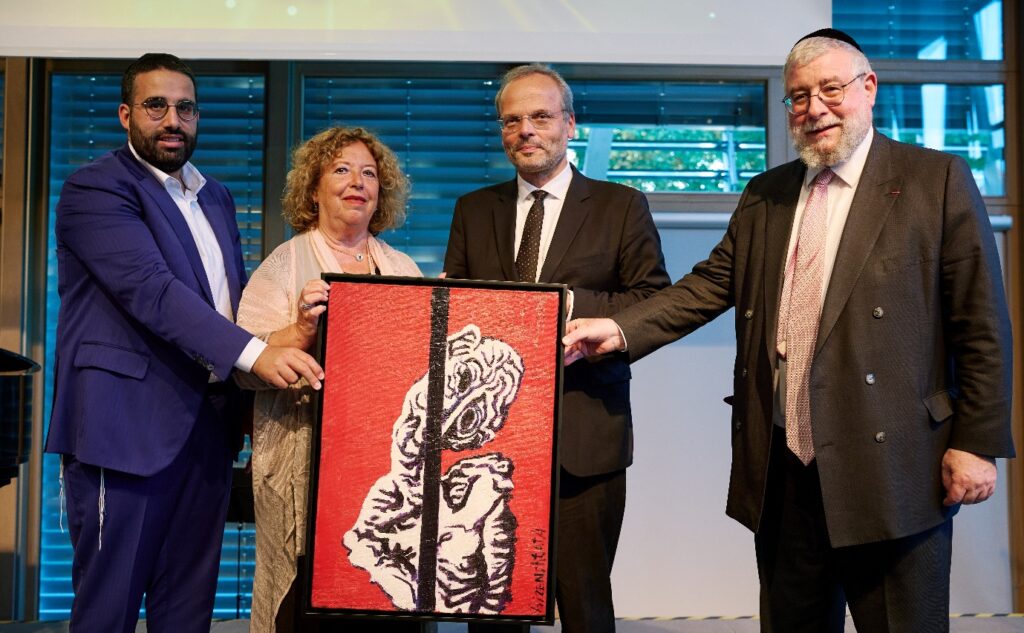Dr Felix Klein, the German Federal Government Commissioner for Jewish Life and Combating Anti-Semitism, was awarded the esteemed Rabbi Moshe Rosen Prize by the Conference of European Rabbis (CER) on Monday evening. The ceremony took place at the Representation of the State of North Rhine-Westphalia in Berlin, attended by German Federal Minister of the Interior Nancy Faeser. The CER recognized Dr Klein’s exceptional dedication to promoting Jewish life in Germany and his resolute fight against anti-Semitism.
The prize is named in honour of the former Chief Rabbi of Romania, who made significant sacrifices to protect his community during the Communist era. The award has been given to individuals who have significantly contributed to positive societal change. Dr Felix Klein, who has served as Germany’s Commissioner for Combating Anti-Semitism since May 2018, previously had a distinguished career in the German Foreign Service, notably as a special representative for relations with Jewish organizations and anti-Semitism issues.
In his role, Dr Klein has spearheaded the development of a comprehensive strategy to combat anti-Semitism in Germany. He has focused on integrating Jewish life into political and social spheres during challenging times, raising awareness about Jewish life. He has consistently advocated for identifying and addressing the roots of anti-Semitism and hatred of Israel, pushing for robust legislative measures and educational initiatives, as highlighted by the CER.

Credit: Henning Schacht
German Minister of the Interior Nancy Faeser commended Dr Klein: “We must unite all societal forces – law, politics, business, and civil society – to combat anti-Semitism and protect Jewish life. Dr Felix Klein exemplifies this commitment. Since 2018, he has steadfastly fought against hatred of Jews, reflecting our state’s dedication to strengthening Jewish life. The European Rabbinical Conference’s decision to honour him with the Moshe Rosen Prize is well-deserved. This award is a reminder for all of us to do everything in our power to protect Jews in Germany.”
Chief Rabbi Pinchas Goldschmidt, President of the CER, praised Dr Klein’s work: “Few people in such roles speak out as consistently as Dr Klein, analysing, identifying, and combating anti-Semitism and hatred of Jews in all its forms. His efforts are invaluable for Jews in Germany and beyond. We are profoundly grateful to him and the German government for prioritising the future of Judaism. This prize is a testament to his dedication.”
Chief Rabbi Goldschmidt also emphasised the ongoing need for action: “Anti-Semitism, whether from left-wing, right-wing, or Muslim extremists, is not just a Jewish problem but a societal one. It threatens our liberal way of life, unity, justice, and freedom. We must ensure clarity in this debate and be consistent in protecting Jewish communities, prosecuting perpetrators, and managing migration and integration. Addressing groups like Hamas, Hezbollah, the Houthi, and the Muslim Brotherhood, and listing Iran’s Islamic Revolutionary Guards as a terrorist organisation, are crucial steps. Now is the time for decisive action.”

Credit: Henning Schacht
Dr Felix Klein expressed his gratitude: “I am deeply honoured to receive the Rabbi Moshe Rosen Award. Chief Rabbi Goldschmidt and the CER tirelessly work to ensure that Jewish life in Europe continues to flourish. The CER’s recent move from London to Munich demonstrates their confidence in Germany, a source of pride for us all.”
Dr Klein received a painting by Moscow-born French-Austrian Jewish artist Alexander Aizenshtat, dedicated to the victims of the Nazi regime’s T-4 programme, a precursor to the Holocaust. The artist noted that the efforts of individuals like Dr Klein aim to prevent such atrocities from ever recurring.
The award ceremony featured music by Jewish and Israeli composers such as Jacques Offenbach, Ernest Bloch, and Shlomo Gronich. Dr Klein, a member of the Diplomatic String Quartet Berlin, surprised attendees by playing the violin to the cheerful melody of “Yeshli Simpatia.”











